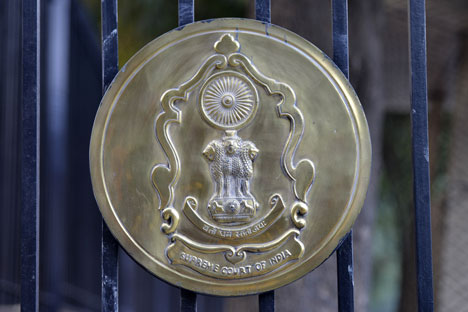
New Delhi: Opponents of gay sex on Thursday accused the Centre of doing a "U-turn" on the subject of quashing the law that criminalises homosexual acts and sought the Supreme Court's permission to present their views.
The five-judge constitution bench that is examining the legal validity of Section 377 of the Indian Penal Code said they would get an hour and a half to argue their case on Tuesday. After that, the court would conclude the hearing and reserve the verdict.
Several organisations representing various religions are on Tuesday expected to argue against scrapping the section, struck down by Delhi High Court in 2009 but restored by the apex court in 2013.
On Wednesday, the Centre had left the matter to the "wisdom" of the court, fearful of taking any stand since backing gay rights would annoy its traditional support base while backing the ban could alienate the young.
Advocate Manoj V. George, appearing for an Odisha-based Christian organisation, on Thursday accused the Centre of having "taken a U-turn, which is a cause of serious concern for the public at large".
He cited how, in 2013, then additional solicitor-general P.P. Malhotra had told the apex court that Section 377 ought to be retained.
"The position of the government was something else at that time. Three private members' bills were moved in Parliament to strike down Section 377 but they were defeated," he told the bench of Chief Justice Dipak Misra and Justices R.F. Nariman, A.M. Khanwilkar, D.Y. Chandrachud and Indu Malhotra.
Justice Khanwilkar denied that the government had made any U-turn. Justice Misra said that even if additional solicitor-general Tushar Mehta had argued the whole day, it would not have made any difference, for the court was only concerned with the constitutionality of the anti-gay law.
George said that penal code provisions came under the concurrent list and the states were authorised to delete any section if they so wanted. That no state had removed Section 377 so far, he argued, reflected how necessary the law was.
Justice Misra retorted that if the states and the Centre avoided taking a stand on the matter, it did not mean that the courts could not strike down a provision that it saw as violating citizens' fundamental rights.
George contended that the LGBT (lesbian, gay, bisexual and transgender) community made up just five per cent of the country's population, and that the remaining 95 per cent were opposed to homosexual practices.
But the bench said that even if one person complained that his fundamental rights were being violated, the court was bound to examine it.
Earlier, Justice Malhotra had said that the stigma attached to the LGBT community prompted many homosexuals to marry members of the opposite sex. Further, the community members rarely receive adequate health care in the country.
"This community feels inhibited to go for medical aid due to prejudices against them because of family pressures, societal pressures. They are forced to marry (members of the) opposite sex and it leads to bisexuality and mental trauma," Justice Malhotra said.
She added that many animals, apart from humans, engaged in homosexual acts. "It is not an aberration but a variation," she said.
Justice Chandrachud referred to Section 21A of the Mental Health Care Act, 2017, which prohibits discrimination on the ground of sexual orientation.
Senior advocate C.U. Singh, appearing for certain LGBT clients, said that since the 2017 act recognises differences in sexual orientation, other laws cannot discriminate between them.
Advocate Maneka Guruswamy, who appeared for a group of gay IITians, rued that although the Supreme Court had recognised the concept of live-in relationships, the LGBT community continued to face discrimination.










